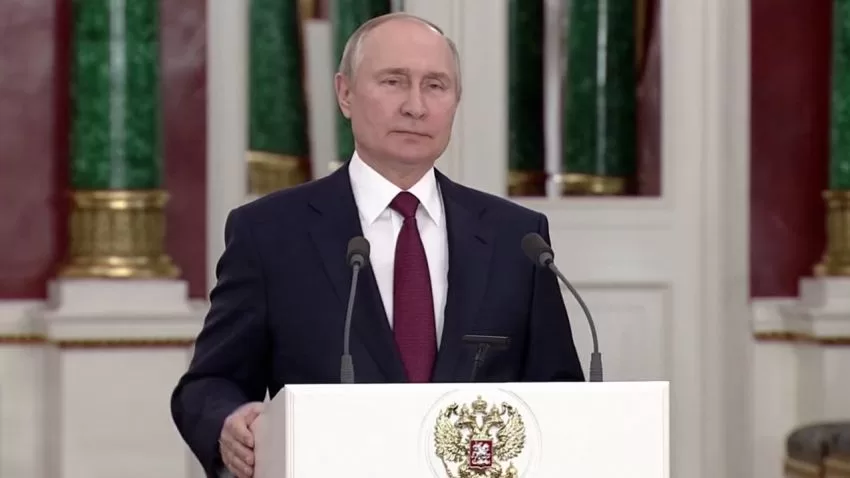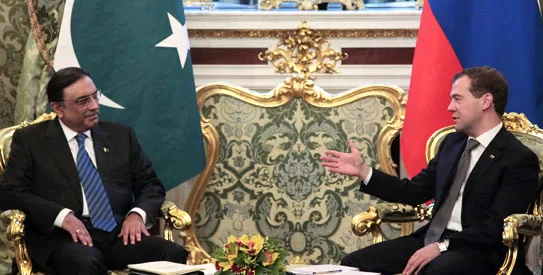For over six decades, Pakistan has lived under an uncertainty cum-insecurity syndrome in the context of its relations with Russia, especially in the Soviet era. During early days, Soviet quest to reach warm waters was interpreted as Russian design to sever Baluchistan from Pakistan; and analysts were not widely off the mark. USSR was instrumental in encouraging the regimes in Kabul to adopt a semi-hostile stance towards Pakistan. Soviets always supported Indian stance on Kashmir and had significant contribution towards creation of Bangladesh. Pakistan’s memberships of SEATO, CENTO and allowing Americas to conduct U-2 flights from Peshawar were some of the irritants which kept the bilateral relations between Pakistan and Russia in a circle of no joy. After Soviet occupation of Afghanistan, Pakistan became directly involved in the Afghan struggle to oust the invader. After the demise of USSR, Russia had been accusing Pakistan of supporting Islamist insurgencies in Chechnya and other areas, especially during Yelsin days.
Russia and Pakistan’s relations indeed have an interesting history, marred by periods of attractions and repulsions. More than strictly a bilateral activity, this relationship has been a by-product of the ‘Great Game’ alignments/ realignments and the flux of Indo Pak dynamics.
President Vladimir Putin’s reelection has enhanced the chances of yetanother cozying up spike in Pak-Russia relations. Putin polled 64 per cent votes to win the third term. This high approval rating gives him the mandate to re-orient Russia’s foreign policy.
Earlier on also, Russia had shown sporadic keenness in Pakistan through the Steel Mills project, and an offer of providing a nuclear power plant; however such thaws were short lived, often overtaken by fast moving events like Soviet occupation of Afghanistan and the 9/11.
Now Russia has offered to finance the Iran-Pakistan gas pipeline project. While America is doing all it could to scuttle the project, Russia is extending a helping hand. Moreover, Russian investors are also keen to invest in the Thar Coal project. Pakistan should not hesitate to take up these offers. Putin’s vision to restore Russia to great power status offers opportunities for Pakistan to realign its relations with Russia. Over the last one year, Russia has been sending the signals of its reassertion at the global level.

Now Russia has offered to finance the Iran-Pakistan gas pipeline project. While America is doing all it could to scuttle the project, Russia is extending a helping hand. Moreover, Russian investors are also keen to invest in the Thar Coal project. Pakistan should not hesitate to take up these offers.
Putin’s vision to restore Russia to great power status offers opportunities for Pakistan to realign its relations with Russia. Over the last one year, Russia has been sending the signals of its reassertion at the glob- al level. Some of the actions include: two double vetoes on UNSC resolutions pertaining to Syria, shielding Iran against the steamrolling American sanctions, its gas giant Gazprom’s unwavering support for IP pipeline and test firing of a new category of Intercontinental Ballistic Missile (ICBM) to counter the American plans of placing missile interceptors in Europe in the garb of false flag threat from Iran etc.
Russia has successfully tested the newly designed missile to over- come the American missile defense system. Missile was fired just after four days of the NATO summit in that confirmed the Chicago with alliance’s intent to go ahead with building missile shield in Europe. Russian officials say they remain unconvinced by the American assurances, and Mr. Putin has called for the production of new missile systems to be doubled in 2013. The test took place just two weeks after Putin assumed the presidency. In a snubbing signal to the US, Putin also canceled a visit to the United States for a summit meeting of the G-8; instead Prime Minister represented the country.
Now Russia no longer wants to continue ceding space to the US. Russia is feeling the heat of its own physical space being threatened by the US mindset of expansionism. Russian differences with America on missile shield are irreconcilable. Pakistan also feels the pinch of the upcoming America assisted Indian missile defence shield.
Russia has a deep interest in the reset of relations between the USA and Pakistan. Russia has been viewing with concern that India has decisively aligned itself with the US and that America has not just gained access to South Asia, but is also making fast inroads into Central Asia. Russia is seeking an ally in the region as a substitute for India. As Pakistan is struggling to distance itself from America, Russia is naturally more interested in Pakistan than ever before. Ironically, once again, Pak-Russia relationship may improve, but as a byproduct of regional and global dynamics.
Relations between long-term allies Pakistan and the United States have hit an all time low. Pakistan is current- by working to evolve an action plan, based on the Parliamentary recommendations, to put its linkages with the US back on track. American misadventure in May 2011 to enter Pakistan to conduct a raid on Osama bin Laden’s compound without informing Pakistan has created unprecedented public outrage against the US. People of Pakistan are in no mood to allow the political leadership to continue hobnobbing with America. Moreover, a premeditated attack on Pakistan’s border posts in November 2011, killing over two dozen soldiers has alienated the military high-ups as well; Pakistan’s military leadership has been instrumental in keeping the functional façade of Pak-US relations afloat. In an unprecedented move, Russia denounced last year’s NATO cross border raid on Pakistan’s Salalah check posts and is believed to have backed Islamabad’s move to sever the supplies for NATO/ISAF forces in Afghanistan.
From Pakistan’s side, a desire of warm relations with Russia came to surface in the form of a landmark announcement by Pakistan’s National Security Committee, which for the first time, recommended strengthening of the country’s relations with Russia as one of foreign policy objectives. Recommendations were unanimously approved by the Pakistani parliament. This indicates the national desire for closer ties between Moscow and Islamabad. Not long ago, such intent would have been unthinkable.
Earlier, Russia’s staunch sup- port for Pakistan’s arch-rival India, and Pakistan’s support for Afghan Mujahedin who fought the Soviet Union during its decade long occupation of Afghanistan have been the main hurdles. However, now both the countries appear ready to shed the legacy of historic drag and move forward.
In May last year, President Zardari undertook a historic visit to Moscow, the first official trip by any head of state from Pakistan in 37 years. During President Putin’s visit, apart from holding bilateral talks with the country’s leadership, the Russian leader will also attend a quadrilateral summit. This summit would be attended by leaders of Pakistan, Russia, Afghanistan and Tajikistan, and focus on regional issues with particular emphasis on the Afghan endgame.
Analysts point out a strategic shift in Pakistan’s foreign policy and opine that ties between Moscow and Islamabad have deepened as a result of Pakistan’s widening rift with Washington. For the last two years, the number of informal and formal contacts between the highest tiers of the leadership of the two countries has been snowballing at a healthy rate.
Russia and Pakistan are struggling to off load their historic baggage of mis- trust. Putin is starting his new term and his first foreign visit would be to Pakistan. Hopefully, the visit by President Putin, first ever by a Russian President, would create an enabling environment for a new perspective for forward movement. It is premature to establish whether the two countries are heading for an enduring strategic partnership. As a first step both should aim at a sustainable stable relationship. After an unpleasant experience with the Americans, people of Pakistan are in no mood for another unconditional deadly embrace. Managing relations with unequal states is always a complicated chore. Pakistan’s government needs to take stock of lessons learnt from earlier experiences of steering its relations with major powers while revamping its Russia policy.




